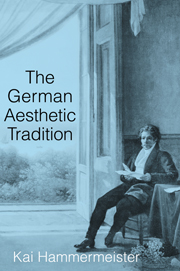4 - Schelling
Published online by Cambridge University Press: 14 January 2010
Summary
If Kant's Critique of Judgment marks the low point of classical German philosophy in respect to the philosophical significance attributed to the work of art, the writings of Friedrich Wilhelm Joseph Schelling (1775–1854) mark the peak in the estimation of art's role for philosophy. In Schelling's early writings, art is not merely one of many possible objects of philosophy but, rather, an integral part of it. Moreover, art is considered indispensable insofar as it is seen as the only means of completing the philosophical system that Schelling proposes. It might go too far, though, to advance the thesis, as Dieter Jähnig does, that only in Schelling's work, even more precisely, only in the sixth chapter of the System des transzendentalen Idealismus (System of transcendental idealism) of 1800, did Western philosophy envision an intimate mutual dependency of art and philosophy. The fact is that romantic philosophy in general esteemed art as the necessary completion of philosophical investigation. Schelling is probably the one who thought through this position with the most philosophical rigor and who contributed the most coherent investigation, but this is due to the fact that Schelling remained committed to the idea of the philosophical system, whereas most romantics took a much more ambivalent stance toward systematic philosophy and the demands it places on the form of argumentation. Friedrich Schlegel (1772–1829) declared: “It is equally deadly for the spirit to have and not to have a system. Thus, one will have to decide to combine both.”
- Type
- Chapter
- Information
- The German Aesthetic Tradition , pp. 62 - 86Publisher: Cambridge University PressPrint publication year: 2002

